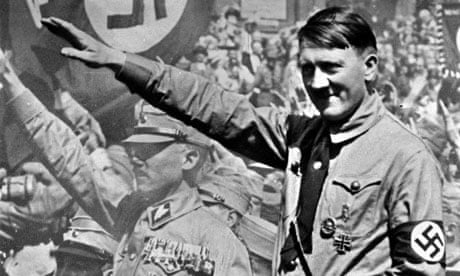The 80th anniversary of Adolf Hitler's appointment as chancellor of Germany is to be marked across the country with a series of events to commemorate a day that became a crucial turning point for the world.
Exhibitions, concerts, guided tours and a special session of parliament on Wednesday will kick off a year of projects inviting Germans to reflect on Hitler's rise to power and how its citizens aided his accession.
Chancellor Angela Merkel will this morning open the Berlin 1933 – Road to Dictatorship exhibition at the documentation centre Topography of Terror, on the former grounds of the SS headquarters in Berlin. She will also give a speech there, one of the most visited Nazi-era memorial sites, at almost precisely the same time Paul von Hindenburg, the then president of the Reich, swore in Hitler as chancellor eight decades before.
Merkel will also take part in a special parliamentary session in the Bundestag to remember the victims of National Socialism.
At the German History Museum, an exhibition called Destroyed Variety, Berlin 1933-1938, which runs until November, will chart the consequences of the National Socialists' dominance of German life between January 1933 and the November Kristallnacht pogrom of November 1938, when Jewish businesses and synagogues were torched.
At the Brandenburg Gate, an outdoor exhibition will recall the torchlit parade of SA stormtroopers and SS detachments who marched through the gate and down the Unter den Linden boulevard on the evening of 30 January 1933, to the cheers of thousands of Germans lining the route.
Elsewhere in Berlin, an open-air exhibition of portraits on huge pillars will highlight the biographies of about 200 Germans who were persecuted by the Nazis. One will stand outside the KaDeWe department store, whose Jewish owners were robbed of their property by the Nazis.
Among a total of about 120 projects throughout the city is a Zeitzeugen, or Witness, app, created by the History Workshop, which can be downloaded on to smartphones and will guide visitors between sites connected to 1933 and Hitler's takeover.
